
 |
| |||
|
Having given waiting for that last episode of that Daleks! thing (must only have been 5 then, odd number for a run ahem) .... I watched .... 13's last show. Deaths! Actual deaths! And now she's gone. Byeeeeeeeeee! 
__________________ [SIGPIC][/SIGPIC] [B] "... the days ahead will be filled with struggle ... and coated in marzipan ... "[/B] |
| ||||
| Despite the Outrage, Doctor Who Is Less ‘Woke’ Than It’s Been in Decades / Escapist Magazine "With rumors circulating that Jodie Whittaker may depart the lead role at the end of her third season, it seems right to reflect upon her time in the TARDIS. In particular, one of the most revealing and interesting aspects of that time: the persistent criticism that the show’s recent seasons have been “too woke” or “too politically correct.” It’s interesting to think about what those phrases mean, particularly in the context of the most conservative stretch of Doctor Who in over three decades. The recent seasons of Doctor Who overseen by Chris Chibnall have been criticized in some quarters for being more radical than the ones that came before. This is a frequent attack in the British tabloids; The Telegraph called it “flat, worthy and woke,” while The Sun ran stories about the show’s “unbearable political correctness.” Former Top Gear host Jeremy Clarkson complained that the show was pushing “Lefty dogma,” even though he hadn’t watched Doctor Who “since [he] was a small boy.” Of course, the recent arguments about the politics of Doctor Who are just part of a larger culture war. This war has encompassed other franchises like Star Trek and Star Wars. As with criticisms of the perceived liberal bias of recent entries in the Star Wars or Star Trek canon, criticisms of this recent relaunch of Doctor Who betray a complete lack of awareness of the franchise’s history. After all, Star Trek has long been a socialist utopia while the original Star Wars was an anti-Vietnam War film. Naturally, the politics of Doctor Who have shifted over the years. However, the show has been openly radical at several points in its own history. When script editor Andrew Cartmel took over the series in 1987, he planned to use it “to overthrow the government.” Thatcher became a target for the show in stories like “The Happiness Patrol,” and the impact of Thatcherism on Britain was the subject of the original run’s last story, “Survival.” When the show returned to television in 2005, producer Russell T. Davies upped the ante. “Aliens of London” found the prime minister, who was intended to resemble Tony Blair, murdered and shoved in a cupboard as the show railed against the march to the Iraq War. The ghost of Tony Blair would resurface in “The Sound of Drums” when the villainous Master (John Simm) reinvented himself as a populist politician, who was complicit in mass murder and attempted conquest. Steven Moffat — Davies’ successor — was less directly provocative, but he offered a similarly scathing take on Britain’s electoral politics in his second script as showrunner. In “The Beast Below,” the Eleventh Doctor (Matt Smith) opines, “Once every five years, everyone chooses to forget what they’ve learned. Democracy in action.” Under Moffat, the fascist Daleks reinvented themselves as parliamentary democracy in “Asylum of the Daleks.” After all, it was Moffat who first confirmed that Time Lords could change gender during regeneration — first in his comedy special “The Curse of Fatal Death” and then in Neil Gaiman’s “The Doctor’s Wife” during his tenure as showrunner. Moffat revealed the Master regenerated into “Missy” (Michelle Gomez) in “Dark Water” and wrote the first in-continuity male-to-female regeneration in “Hell Bent.” The regeneration from Peter Capaldi to Jodie Whittaker did not come from nowhere. In contrast, the Thirteenth Doctor (Whittaker) has been less aggressively proactive than her predecessors. The Tenth Doctor (David Tennant), in another allusion to Margaret Thatcher and the Falklands War, toppled the U.K. government on a whim in “The Christmas Invasion.” The Eleventh Doctor aggressively rewrote the history of Kazran Sardick (Michael Gambon) in “A Christmas Carol” when he refused to help save the lives of thousands of people. In contrast, the Thirteenth Doctor has struggled to hold authority figures to account. The Doctor witnesses characters like Jack Robertson (Chris Noth) and Daniel Barton (Lenny Henry) endanger billions of lives and just lets them walk away. However, it runs deeper than that. The Thirteenth Doctor is much less willing to upset the status quo than her immediate predecessors, even when that status quo is manifestly unjust. In “Planet of the Ood,” the Tenth Doctor chastises himself for failing to consider the suffering of a slave race in an earlier adventure, becoming embroiled in a brutal slave revolt to overthrow the humans who have been exploiting the Ood. In “Oxygen,” the Twelfth Doctor (Capaldi) finds himself taking on and dismantling late-stage capitalism. These are radical ideas. In contrast, “Kerblam!” finds the Thirteenth Doctor saving space Amazon while insisting that “the systems aren’t the problem.” In “Thin Ice,” the Twelfth Doctor sternly lectures his young black companion Bill (Pearl Mackie) about the importance of not being provoked by racists, before punching a racist in the face himself. It’s a self-aware joke about the privilege the Twelfth Doctor enjoys as a white man. In contrast, “Rosa” finds the Thirteenth Doctor earnestly making her companion Graham (Bradley Walsh) complicit in systemic racism, preferring to allow change to happen at its own historically predetermined pace. To be fair, there is an argument to be made that the Thirteenth Doctor places a premium on the idea of observing and witnessing, expanding the longstanding metaphor of the TARDIS as a television set. This argument is best articulated in the episode “Demons of the Punjab,” in which the Thirteenth Doctor is mirrored with the eponymous demons. They are a race of former assassins transformed into passive observers, witnessing but not interfering — watching and learning. Still, there’s a strong deference to authority that runs through the Chibnall era. The show has historically treated the TARDIS’ appearance as a police box as a wry joke, with the Twelfth Doctor even mocking Clara (Jenna Coleman), “I’m not actually the police; that’s just what it says on the box.” In contrast, the Chibnall era embraces the police box unironically as a mission statement, unsurprising for the writer who oversaw Law & Order: UK and created Broadchurch. With the departure of Graham and Ryan (Tosin Cole) in “Revolution of the Daleks,” the Thirteenth Doctor’s longest-serving companion becomes Yasmin Khan (Mandip Gill). Yaz is a police officer, and episodes like “Praxeus” suggest that Yaz might be the companion most likely to be “her equal.” In “The Timeless Children,” Chibnall even suggested the Doctor herself was a police officer, that a secret earlier incarnation imagined themselves as the Irish Garda Brendan (Evan McCabe). While stories like “Fugitive of the Judoon” and “Revolution of the Daleks” are perhaps more skeptical of law enforcement, the Chibnall era lacks the contempt for authority figures evident in the Tenth and Twelfth Doctors’ long-standing mistrust of soldiers and politicians. If anything, the content of Doctor Who is much more conservative and much less activist than it has been at any point since 1987. So, where do these criticisms of being “too woke” or “too politically correct” come from? The answer would seem to be depressingly obvious: the casting. These charges began when the show swapped from a male lead to a female lead for the first time, as well as when Chibnall made a point of diversifying the ensemble by casting more performers of color. It seems likely that complaints about the show’s “politics” amount to criticisms of this. Of course, as any critic knows, a film or television show that features a female lead is not necessarily feminist. While Chibnall deserves credit for pushing for more diversity both in front of and behind the camera, the discourse is truly broken if simply putting women and people of color on screen is treated as “political correctness gone mad.” Even then, Chibnall is far from radical. When Graham and Ryan left, it seemed like Doctor Who might have its first entirely female TARDIS crew ever with the Thirteenth Doctor and Yaz, only to immediately announce John Bishop would be joining the show. In truth, Doctor Who is more conservative than it has been in decades. It respects the police, it tempers the Doctor’s anarchist tendencies, and it largely rejects dramatic systemic or social change. The show arguably hasn’t been more conservative since producer Barry Letts “exiled the Doctor to Earth and made him a Tory” back in 1970. Apparently, in some quarters, merely being a woman or person of color on television is “too politically correct.”"
__________________ People try to put us down Just because we get around Golly, Gee! it's wrong to be so guilty |
| ||||
Who: Before And After #281aName: Stephen Whittaker Year(s): 1968 Stories: The Web Of Fear episode 1 - The Web Of Fear episode 3 Character(s): Craftsman Stephen Weams 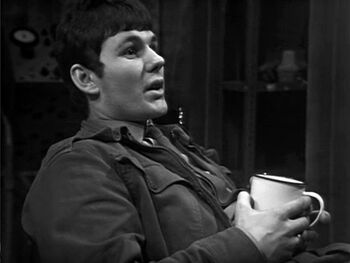 Before Who: Films - To Sir, with Love* (1967)  Television: Bewitched: Eye of the Beholder / I Dream of Jeannie: The Moving Finger / Out of the Unknown: The World in Silence / Z Cars: Finch And Sons After Who: Films - Chastity (1969), Bury Me an Angel (1971), The Great Gundown (1977), The One and Only Phyllis Dixey (1978), Yanks (1979), The Keep* (1983)  Television - You and the World [2 episodes as Bobby] / Callan: The Richmond File: A Man Like Me / Crown Court: Settling a Score / The Legend of Robin Hood [6 episodes as Ralph Gammon] / Plays for Britain: The Paradise Run / Target: Set-Up / Blott on the Landscape: Man in a Tree Who: Before And After #281bName: Bernard G. High Year(s): 1968 / 1975 Stories: The Web Of Fear episode 1 / Terror Of The Zygons part 2 Character(s): Soldier / Corporal Palmer 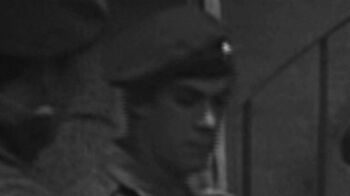  Before Who: Films - None Television: Crossroads [3 episodes as Bill Jeavons] / The Seven Deadly Sins: In the Night / Dixon Of Dock Green: Grenade / Z Cars ]4 episodes as DC John] After Who: Films - Night After Night After Night (1969) Television - The Saint: The World Beater / Paul Temple: Who Dies Next / Paul Temple: Death Sentence / Bill Brand: Tranquillity of the Realm Who: Before And After #281cName: Joseph O'Connell Year(s): 1968 Stories: The Web Of Fear episode 2 Character(s): Private O'Brien 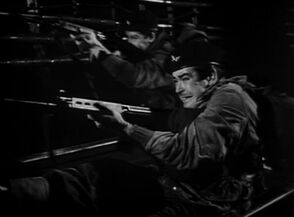 Before Who: Films - None Television: Z Cars: The Great Fur Robbery After Who: Films - None Television - Thingumybob / Callan / Public Eye: Paid in Full* / Special Branch: Error of Judgement  Who: Before And After #281dName: Derek Pollitt Year(s): 1968 / 1970 Stories: The Web Of Fear episode 2 - The Web Of Fear episode 6 / Doctor Who And The Silurians episode 6 Character(s): Driver Evans / Private Wright NOTE: Also appeared as A. St. John D. Caldera in the unfinished 1980 story 'Shada'. Was the brother of Who actor Clyde Pollitt 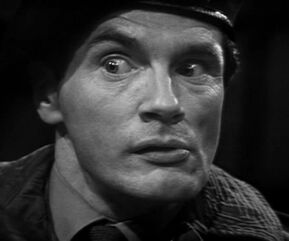 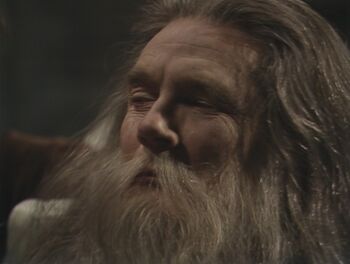 Before Who: Films - None Television: Such Is Life / Strife / ITV Television Playhouse: The Widowing of Mrs. Holroyd / Z Cars: The Victim After Who: Films - The Body Stealers* (1969), Bread (1971)  Television - Biography: Beethoven / The Onedin Line [2 episodes as Inigo Pilgrim]
__________________ People try to put us down Just because we get around Golly, Gee! it's wrong to be so guilty |
| |||
|
Oh I noticed that it had political correctness before (matt smith in a wild west story where no one minded that the white town's local priest was black, changing the maid and her master personalities to make them more flirtatious with each other for those who hadn't figured out they were in a relationship), but it has gotten worse in regards that the story telling has been dumbed down to feeling like school programs, u know like the ones that told you not to smoke or take drugs or why Hitler was a dick. Again never cared if the doctor changed gender but looking at some of BBC's other dramas it does seem that the bbc has a woke agenda. I mean looking at itv Downton abbey they showed how even good people had prejudice towards homosexuality and awkwardness with different races. But this doesn't happen in bbc dramas unless it's a bad person and the main theme of the week. |
| ||||
|
I don't think many have complained about the shows wokeness in recent series. More about pandering to BBC 'messages of the week'. Lecturing us on plastic waste (Praxeus), going all Greta Thunberg (Orphan 55) clumsily dealing with cancer (Can You Hear Me?) Oh and if declaring the Doctor we know and love didn't begin with William Hartnell and instead was preceded by several non-white women (The Timeless Children) isn't political correctness gone mad then i don't know what is. The last series was marred by seemingly endless lecturing that ruined some reasonable stories. |
 |
| Like this? Share it using the links below! |
| |